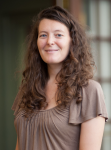 Harvard University Assistant Professor Marine Denolle has been honored with the 2019 Charles F. Richter Early Career Award for her important contributions to developing synthetic seismograms that can be used for ground motion predictions for future earthquakes, with particular applications to how seismic waves behave in sedimentary basins.
Harvard University Assistant Professor Marine Denolle has been honored with the 2019 Charles F. Richter Early Career Award for her important contributions to developing synthetic seismograms that can be used for ground motion predictions for future earthquakes, with particular applications to how seismic waves behave in sedimentary basins.
Denolle is a leading researcher in developing and refining algorithms to turn ambient seismic noise collected by seismograms into “virtual earthquake” data, including finding ways to correct for the depth of the virtual earthquake’s “source” in these synthetic seismograms. The seismograms can then be used to study how seismic waves are amplified in sedimentary basins, which underlie a number of major cities worldwide from Los Angeles to Tokyo.
In a paper published in the journal Science in 2014, Denolle described how she deployed instruments along the San Andreas Fault in the San Gorgonio Pass in California, to test whether sedimentary basins near San Bernardino might funnel seismic energy from the San Andreas Fault into the Los Angeles basin. She concluded that the Los Angeles metro area could be threatened by this type of ground motion.
Gregory Beroza, Denolle’s thesis advisor at Stanford University, asked then-U.S. Geological Survey seismologist Lucy Jones about the real-world relevance of the Science study. Jones told Beroza that Denolle’s modeling was the “basis of our seismic resilience plan with the City [of Los Angeles],” Beroza recalled. “So Marine’s work has had a significant real-world impact.”
The study, among others, shows that Denolle is an exceptional seismologist due to her grasp of the entire scientific process, from understanding theory to developing experiments and collecting and processing her own data, her colleagues said in their nominations of her for the Richter Award.
Using the methods she developed, Denolle has also characterized sedimentary basin effects from the Kanto Basin that underlies Tokyo. Although there is dense seismic station coverage around Tokyo, Denolle’s studies show that the virtual earthquake technique also can be used to look at basin amplification effects for local earthquakes in less well instrumented areas.
At Harvard, Denolle has added environmental seismology to her interests, developing new approaches for monitoring aquifers with seismological remote sensing, as well as monitoring the impacts of extreme climate events such as drought and floods.
Denolle received her Bachelor’s degree in earth sciences (2006) and her Master’s degree in geophysics (2008) from the Ecole Normale Sup´erieure – IPGP in France, and her Ph.D. in geophysics from Stanford University in 2014. She was a Green Postdoctoral Fellow at the University of California, San Diego from 2014 to 2016.
